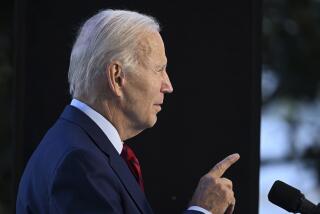Plan Compensates Health Workers Hurt by Smallpox Vaccine
- Share via
WASHINGTON — The Bush administration, attempting to jump-start its stalled smallpox vaccination program, announced a plan Wednesday to compensate public-health and medical response-team members who might be injured by the inoculation.
The administration’s plan, which must be approved and funded by Congress, would compensate vaccinated workers -- and any people who contract a related virus from them -- for medical expenses, a portion of lost wages, disability and death. It is modeled after a federal compensation package for police officers and firefighters.
Until now, the lack of guaranteed compensation for related medical costs or lost wages has discouraged tens of thousands of health-care workers from volunteering for the vaccination program, which the Bush administration has made the centerpiece of its efforts to protect Americans against a potential bioterrorist attack.
Announced by President Bush in December, the vaccination program intended to inoculate as many as 450,000 front-line health-care workers within a month and as many as 10 million police, fire and emergency personnel shortly after that.
As of Wednesday, however, only 12,404 people had been inoculated since the program began Jan. 24.
The administration’s proposal would pay $262,100 -- the same amount paid to police and firefighters -- to public-health and response-team workers killed or totally disabled as a result of the vaccine. It would also compensate workers for some lost wages -- two-thirds of losses incurred after five missed work days -- and related medical expenses.
It was unclear if the compensation plan would satisfy the health-care unions and others that have declined to participate in the voluntary program.
Conditional support was expressed by one of the leading organizations calling for such a program, the 1.5-million-member Service Employees International Union.
“By proposing some compensation for vaccine victims, the administration has given the smallpox program a much-needed shot in the arm,” said union president Andy Stern.
But concerns remain, Stern said.
His union called on Congress to provide adequate funds for the program, “without diverting resources from other public-health priorities,” and to screen health-care workers more carefully for conditions that would predispose them to negative reactions and closely monitor them for serious side effects.
Rep. Henry A. Waxman (D-Los Angeles), who had called on the administration to develop a compensation program, said he was disappointed with the result.
“This doesn’t sound like the right package -- $250,000 won’t compensate a family who loses its sole breadwinner,” he said.
Charles Idelson, spokesman for the 50,000-member California Nurses Assn., called the sick-pay and health-cost provisions “totally inadequate. It should be full compensation, and it should start immediately.”
But even if those concerns were met, it is unlikely that the nurses’ union would reverse its strong opposition to the vaccination program, Idelson said.
The program has also been hampered by the difficulty of balancing the risks associated with the vaccine against the uncertain danger of a terrorist attack using the smallpox virus.
Until now, more than 350 hospitals across the country have declined to participate in the program. The San Francisco Department of Public Health is among the latest agencies either to discourage its workers from participating or to require them to adhere to strict guidelines.
Nurses and doctors at San Francisco General Hospital who want to be vaccinated must rearrange their work schedules, among other things, to ensure that they have no contact with patients for two or three weeks after they are inoculated.
More to Read
Sign up for Essential California
The most important California stories and recommendations in your inbox every morning.
You may occasionally receive promotional content from the Los Angeles Times.










